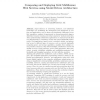Free Online Productivity Tools
i2Speak
i2Symbol
i2OCR
iTex2Img
iWeb2Print
iWeb2Shot
i2Type
iPdf2Split
iPdf2Merge
i2Bopomofo
i2Arabic
i2Style
i2Image
i2PDF
iLatex2Rtf
Sci2ools
160
click to vote
COOPIS
2002
IEEE
2002
IEEE
Composing and Deploying Grid Middleware Web Services Using Model Driven Architecture
Rapid advances in networking, hardware, and middleware technologies are facilitating the development and deployment of complex grid applications, such as large-scale distributed collaborative scientific simulation, analysis of experiments in elementary particle physics, distributed mission training and virtual surgery for medical instruction. These predominantly collaborative applications are characterized by their very high demand for computing, storage and network bandwidth requirements. Grid applications require secure, controlled, reliable, and guaranteed access to different types of resources, such as network bandwidth, computing power, and storage capabilities, available from multiple service providers. Moreover, they demand multiple, simultaneous end-to-end quality of service (QoS) properties, such as delay guarantees, jitter guarantees, security, scalability, reliability and availability guarantees, and bandwidth and throughput guarantees, for their effective operation. Exis...
Complex Grid Applications | COOPIS 2002 | Grid Applications | Grid Infrastructure Middleware | Information System |
Related Content
| Added | 14 Jul 2010 |
| Updated | 14 Jul 2010 |
| Type | Conference |
| Year | 2002 |
| Where | COOPIS |
| Authors | Aniruddha S. Gokhale, Balachandran Natarajan |
Comments (0)

